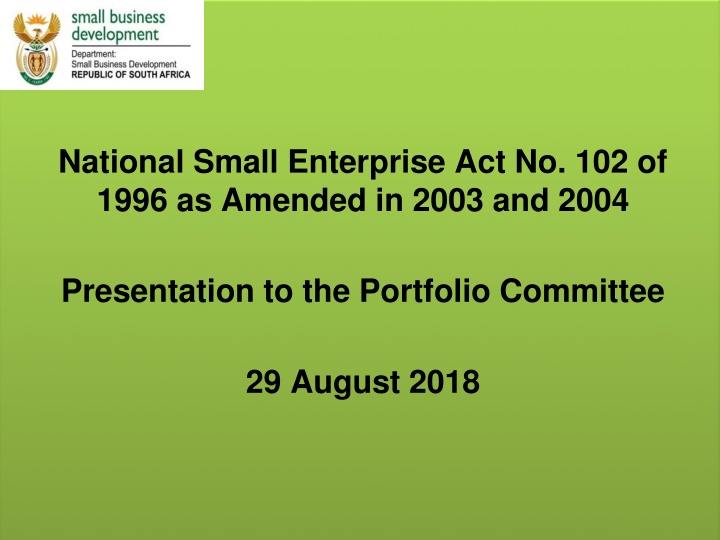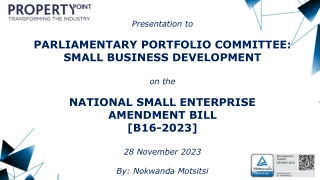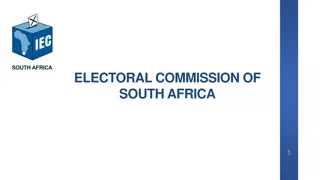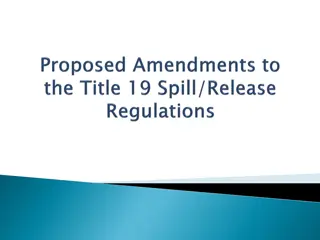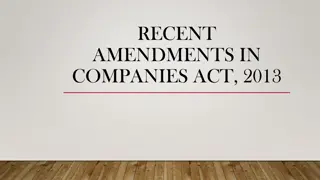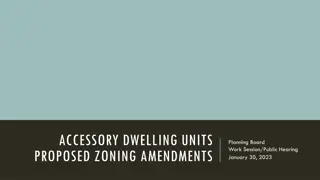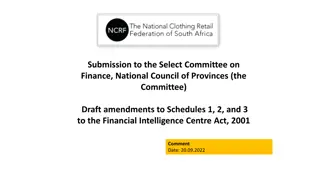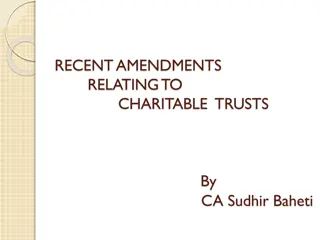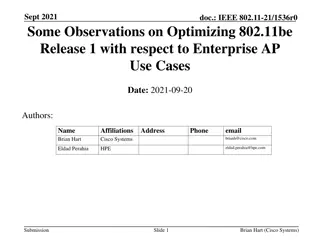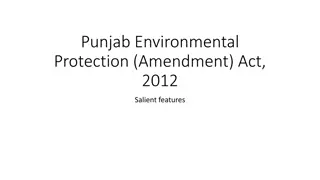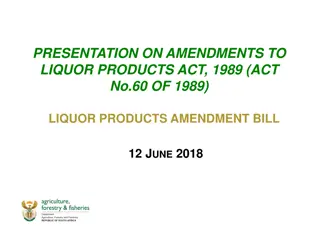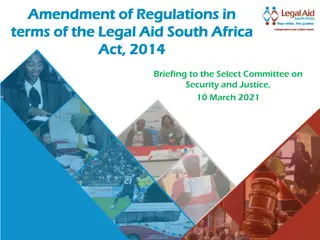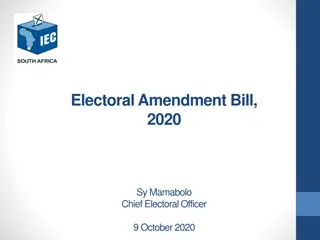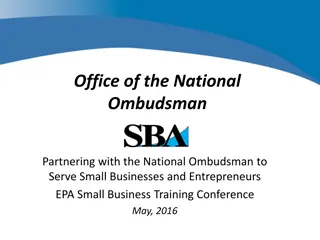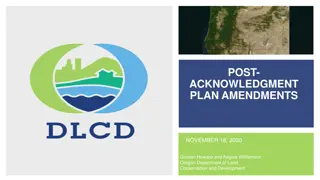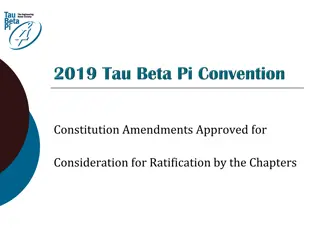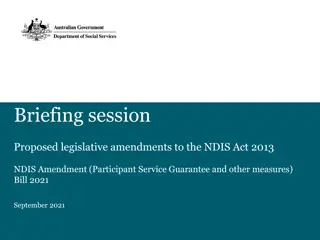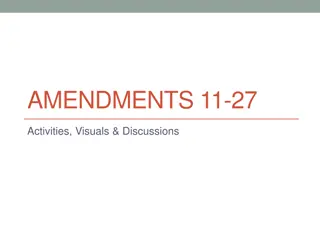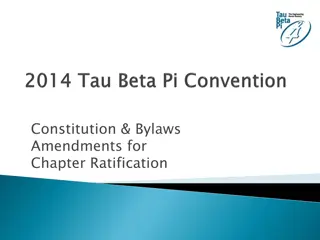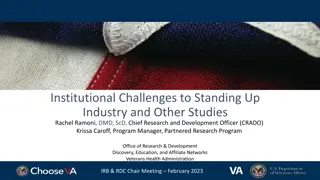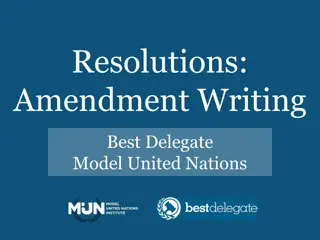Overview of Amendments to the National Small Enterprise Act of 1996
The presentation discusses the amendments made to the National Small Enterprise Act No. 102 of 1996, focusing on updates, definitions, and policy context. It covers the purpose of the amendments, background, stakeholder consultations, and proposed areas for improvement in small business development. The legislative process, research conducted, and future steps are also highlighted.
Download Presentation

Please find below an Image/Link to download the presentation.
The content on the website is provided AS IS for your information and personal use only. It may not be sold, licensed, or shared on other websites without obtaining consent from the author.If you encounter any issues during the download, it is possible that the publisher has removed the file from their server.
You are allowed to download the files provided on this website for personal or commercial use, subject to the condition that they are used lawfully. All files are the property of their respective owners.
The content on the website is provided AS IS for your information and personal use only. It may not be sold, licensed, or shared on other websites without obtaining consent from the author.
E N D
Presentation Transcript
National Small Enterprise Act No. 102 of 1996 as Amended in 2003 and 2004 Presentation to the Portfolio Committee 29 August 2018
PRESENTATION STRUCTURE Part 1: The Amendment of the National Small Enterprise Act Part 2: Updating of Schedule 1 of the NSEA Part 3: Alternate Dispute Resolution 2
SMALL ENTERPRISE DEFINITION SmallEnterprise means a separate and distinct business entity, together with its branches or subsidiaries, if any, including cooperative enterprises, managed by one owner or more predominantly carried on in any sector or subsector of the economy mentioned in column 1 of the Schedule and classified as a micro, a very small, a small or a medium enterprise by satisfying the criteria mentioned in columns 3, 4 and 5 of the Schedule 1 in the National Small Enterprise Act, No. 102 OF 1996 as amended in 2004. [Definition of smallenterprise , previously smallbusiness , substituted by s. 1 (e) of Act No. 29 of 2004.] 3
A. The Amendment of the National Small Enterprise Act No 102 of 1996 Purpose of the Amendment Background Legislative process Progress to date Stakeholder consultations Research conducted Proposed areas of amendment Content development Next Steps 4
POLICY CONTEXT The Mandate Paper adopted by Cabinet dated August 2017 identified job creation and small business development as a priority. Furthermore, the Programme of Action emanating from the 2018 State of the Nation (SONA), mandates the Department of Small Business Development (DSBD) to drive a number of high impact initiatives towards the growth of Small Enterprises. Since the promulgation of the National Small Enterprise Act (NSEA), South Africa s economy has undergone a multiplicity of complex changes and developments, which necessitate a review of the legislation. In 1995, the South African Government formulated an official policy on the Small, Medium and Micro Enterprises (SMME) sector in the form of the White Paper on National Strategy for the Development and Promotion of Small Businesses in South Africa (the White Paper), which became the first attempt at pursuing a more integrated approach to the development and support of Small Enterprises. The White Paperidentified a number of constraints facing small enterprises, for instance, the legal and regulatory environment, access to markets and access to finance. Its primary objective was to create an enabling environment for Small Enterprises. The White Paperwas subsequently translated into the National Small Enterprise Act No. 102 of 1996 with an amendment Bill in 2003 and an amendment act in 2004 respectively. 5
BACKGROUND The National Small Enterprise Act and its amendments National Small Enterprise Act No. 102 of 1996 The National Small Enterprise Act (NSEA) of 1996 was the first Act on small business development post-apartheid and was promulgated as a replacement to the (now-repealed) Small Business Act of 1981. National Small Enterprise Act, No 26 of 2003 This Act amended the National Small Enterprises Act of 1996 to repeal all provisions pertaining to the National Small Business Council and to empower to Minister to establish an Advisory Body to represent the interests of small business. National Small Enterprise Act, No 29 of 2004 This Act amended the National Small Enterprises Act of 1996 to additionally provides for the establishment of the Small Enterprise Development Agency and to repeal all provisions relating to the Ntsika Enterprise Promotion Agency. 6
BACKGROUND (2) With the establishment of the Department of Small Business Development (DSBD) in 2014, it became imperative for Government to consider the revision of the current legal framework in order to situate DSBD and its relationship with the relevant Small Enterprise support institutions within the legal framework. This revision will also ensure that there is alignment with the DSBD mandate and to address the needs and challenges of the sector. A number of issues have been raised by various commentators, which requires a review in the law. On the policy front, the DSBD has embarked on a process of amending the NSEA, 1996 as amended, and review the Integrated Strategy on the Promotion of Entrepreneurship and Small Enterprise largely to boost and propel the Small Enterprise sector. A number of commentators have equally pointed to numerous issues which require a review of the legislation. Amongst others, the issue of concern is the notion that this legislation is mainly administrative rather than developmental in approach. The DSBD is of the view that the policies, legislation and strategies for the development of Small Enterprises in South Africa need to be amended and updated in order to effectively respond to Government s objectives. The need for amendment also emanates from the changes and developments that have taken place in the economy and the prevailing Small Enterprise Ecosystem. 7
THE LEGISLATIVE PROCESS (4) Current stage 11
PROGRESS TO DATE Stakeholder Consultation Research Conducted Proposed Areas of Amendment Content Development 12
STAKEHOLDER ENGAGEMENTS The purpose of the stakeholder consultations were as follows: To facilitate an open and inclusive approach to consultation that provided timeous and transparent information on the review of the NSEA to stakeholders To provide an opportunity for stakeholders to provide feedback on the NSEA and to voice their concerns regarding areas that affect them and their businesses. To gather baseline information held by the stakeholders on the NSEA. 13
STAKEHOLDER ENGAGEMENTS (2) Phase one: Provincial Consultations hosted across nine (9) Provinces The first stage of consultation was focused at provincial and local government level as well as Small Enterprises. Three teams managed the engagements across the country. The DSBD in partnership with the Provincial Departments of Economic Development, the Small Enterprise Development Agency and the Small Enterprise Finance Agency embarked on stakeholder consultations in all nine (9) provinces between 25 January 2016 to 05 February 2016; The aim of these consultations was to solicit inputs into the review of the National Small Business Act, 1996 (Act No. 102 of 1996); Small Enterprises from the seda and sefa database where invited to the provincial consultations. Phase two: National Consultations hosted in Gauteng Province The first national stakeholder consultation took place on 28 June 2016, while the second workshop took place on 22 September 2016. Both these workshops brought together government departments, practitioners, small business owners (formal and informal), cooperatives, academia, business associations, the private sector, agencies, the European Commission, and various experts in Small Enterprise sector. 14
RESEARCH CONDUCTED Report for the Ministry of Small Business, Government of the Republic of South Africa (2014) A Rapid Review of the relevant policies, strategies and laws affecting small business development in South Africa. The review of the major policies, strategies and laws dealing directly with small business development shows significant change since the first White Paper on small business development in 1996. The review covers strategies dealing with youth enterprise promotion, support for women s economic empowerment and reducing the regulatory burden for Small Enterprises. It also looks at the role of provincial authorities and local municipalities. A number of sector-based policies and strategies are examined, including those related to manufacturing, tourism, exports, co-operative enterprises, local economic development and informal traders. While there are sector ministries that will likely continue to champion these sectors, the new Ministry of Small Business will have a critical role to play in advising on, supporting and monitoring small business concerns. 15
RESEARCH CONDUCTED (2) Review and update of South Africa s Small, Medium and Micro Enterprises Sector Definition (2017) The purpose of this study is to review, consolidate and update research undertaken on the South African Small Enterprise Definition; as well as undertake an analysis of developments and changes affecting small business definitions since the last reports were produced in 2010 and 2015 to present best possible options for the Small Enterprise definition to be applied henceforth. Comparative Analysis of SMME Legislation from 8 countries to the National Small Enterprise Act no. 102 of 1996 as amended in 2003 and 2004 (2017) This report presents the results of a comparative analysis of South Africa s National Small Business Act (No. 102) of 1996 with small business legislation in eight other jurisdictions Brazil, India, Kenya, Malaysia, Nigeria, Taiwan, United Kingdom, and United States. The purpose of the analysis was to gain an understanding of the legislative and regulatory measures that the countries under study have adopted to stimulate, support and grow their small business sector, with a view to ascertaining best practices and innovative approaches that South Africa could learn from. This knowledge would, in turn, enhances the amendment of the National Small Business Act currently underway. 16
RESEARCH CONDUCTED (3) Small Enterprise Eco-system (2017) The purpose of this project was conduct research on the Small Enterprise Eco-system. The research was conducted through an assessment of the ecosystem which recognizes that enterprise s outcomes are affected by both internal and external factors. Eco-systems are dynamic in nature and include necessary conditions such as the level of entrepreneurship, finance, markets, regulation and infrastructure. It will connect research, policy formulation governance and implementation within the different institutional mechanisms for the benefit of Small, Medium and Micro Enterprises (SMMEs) and Co- operatives. The intention is to highlight the niche and controlled areas for the Department in order to gain influence and authority within the economic cluster, government and within the country as a whole. 17
RESEARCH CONDUCTED (4) 2017 Annual Review on the Status of Small Business and Cooperatives in South Africa (2017) The purpose of the Annual Review should provide an exposition of trends, new developments and an assessment of the performance of the Small Enterprises within the context of the South African economy and the goals of employment creation, poverty alleviation and reduction of inequality as articulated in the National Development Plan. The Annual Review should provide evidence based recommendations that will be used to enhance existing or develop new policies and legislation for the development of an enabling environment for SMMEs and Cooperatives in South Africa. The 2016 Annual Review has bee finalised and approved by Minister. It will be launched in November 2018. Evaluation of the Integrated Strategy on the Promotion of Entrepreneurship and Small Enterprises Ecosystem (2018) The purpose of the evaluation is to assess the effectiveness of the implementation of the Integrated Strategy on the Promotion of Entrepreneurship and Small Enterprises between the period 2005 and 2014, and the extent to which the anticipated outcomes have been achieved. This study was completed in March 2018 and will inform the Review of the Strategy and well as the Improvement Plan which is currently being implemented 18
PROPOSED AREAS OF AMENDMENT Factors to take into account when amending the legislation stemming from stakeholder engagements and research conducted: Alignment with the 1995 White Paper: A National Strategy for the Development and Promotion of Small Business in South Africa; and With Government objectives, the National Development Plan Annual Review should not be conducted annually, but rather twice during a term of an Administration Review the institutional arrangements Small Enterprise Developments Agency s functions The make-up and role of the National Small Business Advisory Body The consideration of the Small Enterprise Finance Agency to be incorporated into the legislation Amend the Small Enterprise Definition Revise the use of proxies Update the schedule taking into account the updated Standard Industrialisation Codes Consider Alternate Dispute Resolution: Establishment of a Small Enterprise Tribunal Incorporate all developmental aspects as schedules to guide the sector in terms of small business support interventions such as guidance in terms of implementing 30% procurement Simplify the regulatory and policy environment for Small Enterprises as a priority 19
PROPOSED AREAS OF AMENDMENT (2) Professionalisation of Business Advisory Services Access to financial and non-financial support ( also taking into account a possible merger between seda and sefa) Revising sections General Provisions(ss 18-20) of the Act [Section 18: Determination of Guidelines] The Minister may, by notice in the Gazette, publish guidelines for organs of state in national, provincial and local spheres of Government to promote Small Enterprise and the National Small Business Support Strategy. [Section 19: Reports] Annual Review of the Status of Small Business in South Africa The Director-General must submit the Annual Review of Small Business to the Minister before the end of June of each year and the Minister must table it in Parliament. [Section 20: Regulations and amendment of Schedule] (1) The Minister may make regulations regarding- (a) any matter which in terms of this Act is required or permitted to be prescribed. 20
PROPOSED AREAS OF AMENDMENT (3) Provide for the enforcement of 30 day payment Commit to creating access to markets Regulation of business associations Promotion of clusters and networks Make-up of Boards of Small Enterprise promotion agencies Sharing of credit information between financiers and credit reference agencies Special tax treatment Removal of prohibition of cession of receivables or contractual obligations (Government Procurement S19 General Terms and Conditions of Contract and the Comparative Analysis of SMME Legislation in the UK) Research and development and technology transfer Promoting entrepreneurial culture 21
CONTENT DEVELOPMENT Initially, the review to the Act started as amendments to the existing provisions such as the amendments to the definitions and the schedule. However consultations and research pointed to the need to a re-draft of the Act taking into account the aforementioned factors which required more time for the Act to be finalised. In 2018 the Department established a Working Group to focus on the development of the content required for the drafting of the proposed amendments. On 18-19 April 2018, 24 and 25 May 2018 and 01 June 2018, lockout sessions were held at with the Work Groups. The purpose was the consolidation of public comments and workshop the policy issues informing the legislative amendments. The workshop outputs consolidated and considered in the development of the National Small Enterprises Act draft working document. 22
NEXT STEPS The DSBD has submitted a proposal to the European Union s Employment Promotion through SMMEs Support Programme for the Republic of South Africa*, to assist with: Drafting the Bill by March 2019. A position paper on a possible merger between seda and sefa, March 2019 Regulations for Alternate Dispute Resolutions, December 2018 Guidelines for alignment to the Intergovernmental Relations Act, December 2018 *This does not mean that the EU will draft the Bill. Instead it refers to the Departments funding proposals to the EU Programme on the allocation of its R 13 million share of the funding for research and capacity building. The EU Programme has approved the funding to commission local expertise. 23
B. Update on Schedule 1 of the National Small Enterprise Act Purpose Background Current Process Next Steps 24
PURPOSE To provide an update on the work done in amending the definitions and updating the Schedule of the National Small Enterprise Act (NSEA) (No. 26 of 2003) as amended. The amendments to the NSEA 2003, more specifically updating the Schedule of the NSEA of 2003, will bring coherence to our shared obligations to promote the growth and sustainability of small business development across the public sector. In particular adopting the new definitions and the updated Schedule, will establish a platform for a single version of the truth when reporting and measuring the impact of public and private sector investment in Small Enterprises on economic growth and job creation. 25
BACKGROUND The National Small Enterprise Act (NSEA) was promulgated in 1996. The NSEA of 1996 provided for the definition of small business and the establishment of institutional structures to implement the provisions of the White Paperon NationalStrategy for the Development and Promotion of Small Business in South Africa (Notice No. 213 of 1995, published in Gazette No. 16317 of 28 March 1995). In 2003, the National Small Enterprise Amendment Bill was passed substituting the Schedule to that Act in order to reflect the economic position at the time. The Schedule provides for three (3) proxies namely, employment, turnover and assets and for the four categories of small businesses, across a range of economic sectors. Given that the Schedule 1 of the National Small Enterprise Act of 1996, last amended in 2003, is outdated, the DSBD commissioned a Study in 2017 to review the NSEA definition. 26
BACKGROUND (2) This Study found that, among others: The majority of Government departments, entities, agencies and businesses did not make use of the NSEA definition; NSEA does not have the Small Enterprise definition that regulates Government support programmes; Contradictions between the NSEA definition and definitions used in other pieces of legislation and, That the proxies were outdated, complicated to apply, track and verify. 27
CURRENT PROCESS The current definitions classify Small Enterprises into four size classes: - Micro-Enterprise ; - SmallEnterprise ; - Very Small Enterprise ; and - MediumEnterprise . These size classes will cover all forms of ownership and enterprise structures, including sole proprietors, partnerships, companies and cooperative enterprises; they also apply to formal and informal enterprises. In defining these class sizes, three proxies were used: - number of people employed, i.e.: full time equivalents, - value of annual turnover and - value of assets. The review into the use of the definitions and proxies found that many public and private agencies found it difficult to apply all these proxies and that the threshold value of turnover and assets were often inappropriate and difficult to measure. Thus, it is recommended that two proxies are used to define enterprises of different size classes. Furthermore, consultations during the review found that the size class of Very Small Enterprise is not consistent with international practice and many agencies in South Africa found it to be unhelpful. Thus, it is recommended that the term Very Small Enterprise be abolished and subsumed into the size class of SmallEnterprise . 28
CURRENT PROCESS (2) Based on in-depth consultations, the findings of the aforementioned and other related research, the DSBD developed the amendments to Schedule 1 of the National Small Enterprise Act, which: Defines SMMEs, ensuring that these definitions are current, relevant and applicable to the structure and nature of SMMEs. Strives to ensure access to government support programmes while promoting the financial sustainability of SMMEs and their ability to promote and create employment over the medium to long term. The overall results or outputs to be produced are: The update of Schedule 1 of the Act; The development of a guideline (and ultimately Regulations) so that all spheres of government can adopt and apply the new definitions with ease, strengthening the delivery and monitoring of Small Enterprises support, as per the newly proposed Schedule 1; Capacity building in the DBSD, through the development of a manual, guiding the department on the approach, methodology and steps to be followed to amend Schedule 1 on a regular basis by identifying what information needs to be collected and tracked over time. 29
NEXT STEPS In terms of Section 20 of the NSEA the Schedule can be amended without going through the legislative amendment process. Section 20 (2) Regulations and Amendment of Schedule 1 The Minister may, in order to achieve the objects of this Act, by notice in the Gazette amend the Schedule to account for inflation, macro-economic shifts in the economy, any legislation affecting small business, and any other matter which could have an effect on the functionality of the Schedule . Our intention is to take the updated Schedule to Cluster by September 2018, whilst it is gazetted for public comment for 30 days. The updated Schedule will be popularised through a series of Social Dialogues during Global Entrepreneurship Month in November. Key message in the popularization of the Strategy: simplify the information comply, report and monitor; since the updated schedule is merely an amendment, the work commences upon application, compliance, monitoring and reporting on the utilisation of Schedule 1 across all spheres of government and the Small Enterprise Sector. 30
C. Alternate Dispute Resolution Introduction Problem Statement Policy Imperatives Current Redress Mechanisms Access to Justice Institutions in South Africa Country Legislation Comparative Analysis Cooperatives Tribunal Competition Amendment Bill Portfolio Committee Deliberations Proposal for the Establishment of a Small Enterprise Tribunal Status to date Way forward 31
INTRODUCTION One of the DSBD s key strategic objectives is to advocate for a fair, conducive and productive environment for Small Enterprises. The aim is to motivate for the establishment of a Small Enterprise Tribunal whose function would be to level the playing field for Small Enterprises in their dealings with large business and government by offering an accessible, affordable and effective dispute resolution mechanism from contract negotiations to payment terms renegotiations and resolution of non-payment amongst others.
PROBLEM STATEMENT It is generally known that Small Enterprises often find it difficult, financially or for other reasons, to avail themselves of the due process of law in order to defend their interests. The OSIBA Research Report : Rethinking Small Business Support in South Africa, 2011 on the Review of Government Support for Small Business communicates that there is no access to quick and affordable legal process for Small Enterprises. The following list of challenges faced by Small Enterprises in their dealings with large companies and the public sector is not conclusive, but captures the bulk of the challenges: - Small Enterprises are more vulnerable to unfavourable or unfair practices and often do not have the resources to challenge them; - It can be daunting for a small business to take action against another business; especially a larger firm and thus many Small Enterprises opt to not take any formal action again - Small Enterprises are bullied into an onerous and unfair contract, in order to secure a business transaction with a big company and retain the business opportunity and relationship; - Larger firms sometimes use their economic power to impose unfavourable terms; 33
PROBLEM STATEMENT (2) Some payment terms also lead to disputes between small suppliers and larger business both private and public. Some of these terms include the following: Extended payment terms: Use of excessively long payment terms whether proposed in the initial contract or by contract variation; Prompt Payment discounts: Discounts businesses request for paying early or on time. For example, a firm that has agreed to pay 60 days following receipt of an invoice may also ask for an automatic discount of 3% if they pay on or before the 60th day; Pay to Stay clauses: Flat charges which businesses levy on suppliers either as a requirement to be on a supplier list, or packaged as an investment into future business opportunities. It is often indicated that non-payment will result in de-listing; Stocking & listing fees: A cash fee paid up-front by a supplier to guarantee shelf space for a new line. Alternatively, businesses may require suppliers to pay listing fees to cover the cost of the administration of introducing new product lines; Damage/waste payments: Payments requested from suppliers to cover problems ranging from poor stacking of pallets to putting bar code stickers in the wrong place. The payments may include lost profits, the cost of rectifying the problem and an administrative charge. 34
PROBLEM STATEMENT (3) Small Enterprises can face significant problems when trying to challenge another firm s breach of contract. Breaches of contract can include non-payment for a service or not paying on time, failure to deliver services or goods, and being late with services without a reasonable excuse. Late payment occurs when a business has been supplied goods or services on credit, but fails to pay within the agreed term. Legally, if no explicit payment terms have been agreed, the business awaiting payment may charge statutory interest after 30 days; but Small Enterprises would desist from this as they may lose their current and or future contracts Business to business disputes can arise on a range of contractual issues. Small Enterprises may find themselves in dispute over supply chain issues regarding the interpretation of contract terms, logistics, sale of goods, dealing arrangements, and other claims involving the delivery of goods or the quality of a service. There is no mechanism in place to champion the cause of the Small Enterprise, therefore there is a need for Alternate Dispute Resolution. 35
POLICY IMPERATIVE Constitution: Chapter 2: Section 9 Equality Everyone is equal before the law and has a right to equal protection and benefit of the law. Equality includes the full and equal enjoyment of all rights and freedoms. To promote the achievement of equality, legislative and other measures designed to protect or advance persons or categories of persons, disadvantaged by unfair discrimination may be taken. The state may not unfairly discriminate directly or indirectly against anyone on one or more grounds, including race, gender, sex, pregnancy, marital status, ethnic or social origin, colour, sexual orientation, age, disability, conscience, belief, culture, language and birth. No person may unfairly discriminate directly or indirectly against anyone on one or more grounds in terms of subsection (3). (5) Discrimination on one or more of the grounds listed in subsection (3) is unfair unless it is established that the discrimination is fair. Chapter 2: Section 25(4) Property S 25(4)(a)Thepublic interest includes the nation s commitment to land reform and to reforms to bring about equitable access to all South Africa s natural resources. (b)Property is not limited to land S 25(5) The State must take all reasonable legislative and other measures, within its available resources, to foster conditions which enable citizens to gain access to land on an equitable basis. 36
POLICY IMPERATIVE (2) Chapter 2: Section 34 - Access to Courts Everyone has the right to have any dispute that can be resolved by the application of law decided in a fair public hearing before a court or, where appropriate, another independent and impartial tribunal or forum. Chapter 11: Section 198 (a) - Security Services National security must reflect the resolve of South Africans, as individuals and as a nation, to live as equals, to live in peace and harmony, to be free from fear and want and to seek a better life. 37
POLICY IMPERATIVE (3) The 1995 White Paper on National Strategy for the Development and Promotion of Small Business in South Africa articulated the situation and government s planned response as follows: It is generally known that small enterprises often find it difficult, financially or for other reasons, to avail themselves of the due process of law in order to defend their interests. The government is committed to facilitate feasible avenues of legal assistance that could help level the legal playing fields for small enterprises. The government will also support steps to reform the current small-claims-court system, with particular attention to increasing the number of court outlet point; raising the level of claims falling within its jurisdiction (to about R30, 000); integrating it more closely with the legal framework, thereby providing access to interdict procedures; enabling members of closed corporations to utilise the services of the small claims court. Objectives of the National Small-Business Strategy The primary objective of the National Policy Framework is to create an enabling environment for Small Enterprises. In addition to this basic objective of the Policy Framework, i.e.. Level the playing fields between bigger and Small Enterprise through market opportunities, regulations and competitive structures. 38
POLICY IMPERATIVE (3) The National Development Plan (NDP) The NDP weighs in on this issue from the broader perspective of social protection whereby by 2030 an inclusive social protection system addresses all areas of vulnerability and is responsive to the needs, realities, conditions and livelihoods of those who are most at risk. Social protection systems have responded to the growth of temporary and part-time contracts, and increasing importance of self-employment. The systems have set up mechanisms to cover the risks associated with these. 39
CURRENT REDRESS MECHANISMS A diverse landscape of redress mechanisms exists for complaints from business about the delivery of public sector service delivery. SMME Payment Hotline (2010) One of the key challenges faced by Small Enterprises is in the area of collecting payment from the public sector. In 2010, Small Enterprise Development Agency (seda) commenced with managing the seda Payment Hotline to deal with queries around delayed and non payment of invoices by Government and related structures. The seda Payment Hotline would respond to the following: Compilation of relevant and correct information (registered government procurement supplier and departmental procurement chain); Establish legitimacy of complaint (verify information, get relevant documentation); The SMME Payment Hotline managed by seda, which helps Small Enterprises collect overdue payment from the government, is one important attempt to deal with this problem. The seda Payment Hotline only limited as it only focuses on late payments and does not provide dispute resolution for other areas. 40
CURRENT REDRESS MECHANISMS (4) As proposed (in recommendations of the approved Cabinet Memorandum , a designated person/unit in each department or structure will be made available to deal with queries and act as contact for the Hotline Call Centre. The person/unit should have powers and authority to provide a solution or feedback within turn around time. This function was assigned to the DPME. 42
CURRENT REDRESS MECHANISMS (5) DPME Evidence Synthesis to inform and research the effect of Delays in Payment on Small, Micro and Medium Enterprises (SMME s)- 2018 In terms of Section 38(1)(f) of the Public Financial Management Act (PFMA), 1999 (as amended), Accounting Officers are required to settle all contractual obligations and pay all money owing, including intergovernmental claims, within the prescribed or agreed period. On the 15th of March 2005, National Treasury published regulations in terms of the PFMA, requiring Accounting Officers to pay invoices within 30 days of receipt. These regulations specified that the prescribed period for the payment of suppliers is 30- days from receipt of a legitimate (undisputed) invoice. 43
CURRENT REDRESS MECHANISMS (6) Payment of service providers or suppliers within 30 days is a key government priority monitored by government from as far back as 2009. Outcome 12 Chapter of the 2014-2019 MTSF also reports, amongst others, on the performance of departments in relation to compliance with 30 days payment of invoices. The matter has become so important that it is a standing item on the agenda of the President s Coordinating Council (PCC). Cabinet took a decision in 2015 that a special unit must be established within DPME to address the issue of non-payment of suppliers. This unit was to work in a trilateral partnership with National Treasury and DPSA. The mandate of the Special Unit would include: investigating cases where there is late or non-payment of legitimate invoices within 30 days, identifying the root causes and facilitating the process for instituting misconduct proceedings to ensure that there are consequences for late and non-payment of legitimate invoices and support /intervene in cases of continuous non-compliance. The DPME, in partnership with the National Treasury, has been monitoring progress of departments in complying with the legislative requirement that departments must pay invoices within the prescribed period of 30 days from receipt of an invoice. 44
CURRENT REDRESS MECHANISMS (7) DPME Analysis 2017/18 financial year The number of invoices paid after 30 days by National departments remains a concern, with the amount owning at R1,3 billion to service providers. The rand value of invoices owing, has more than doubled in the period leading up to the end of the financial year. This drastic increase in amounts owed by national departments points to poor cash flow management challenges as it implies that departments are running out of cash towards the end of the financial year. The performance of provincial departments has a greater cause for concern in the last few years. This is because of the staggeringly high number of invoices that are paid late to service providers and the impact this is having on the departments ability to continue providing essential services to the communities. There were 57 275 invoices to the value of R5,1 billion that were paid after 30 days during the fourth quarter by the provinces. 45
CURRENT REDRESS MECHANISMS (8) Gauteng province had the highest number of invoices owing and the amounts that were paid after 30 days in both quarters. The province paid 18 711 invoices to the value of R1,5 billion after 30 days. It is followed by Kwazulu-Natal which paid 7 308 invoices to the value of R1,4 billion after 30 days. Western Cape reported the lowest number of invoices that were paid after 30 days, whilst Eastern Cape showed an improvement with the number of invoices paid late (decreasing by 4 902). The bulk of the invoices paid after 30 days are attributable to the health departments followed by Education, Public Works and others. It shows that 74% of the invoices that were paid after 30 days in the fourth quarter were from the health sector. Gauteng is still responsible for majority of the invoices in question, with 17 165 out of the 42 110 invoices that were paid late, attributed to the health sector. It is further worth noting that North West Health is responsible for the 7 366 out of 9 869 invoices that were paid late by the North West provincial departments. 46
ACCESS TO JUSTICE INSTITUTIONS IN SOUTH AFRICA There are multiple avenues available to Small Enterprises when seeking to access justice but all can be expensive, cumbersome and time consuming for your ordinary small business. For small business owners, it is important that disputes are resolved as quickly and fairly as possible to ensure their viability while retaining necessary business relationships. All disputes are different and while some may be resolved through existing mechanisms like ombudsmen of differing sectors, some require legal intervention due to their complexity and nature. These institutions include the following: Small Claims Court does not cater for this sector as the claims cannot be more than R15000 nor be instituted against government institutions; The NationalConsumerTribunal (NCT), which adjudicates on credit and consumer matters, to ensure equity in the credit market and balances the rights and responsibilities of credit providers; consumers; and vulnerable groups that include small enterprises; The NationalCreditRegulator (NCR), which regulates the consumer credit industry, to improve consumer protection in the end-user credit market and provide effective debt counselling and review mechanisms. 47
ACCESS TO JUSTICE INSTITUTIONS IN SOUTH AFRICA (2) The Competition Commission, which is responsible for the investigation, control and evaluation of prohibited practices, exemption applications, mergers and acquisitions; The Competition Tribunal, which is an adjudication body responsible for promoting and maintaining competition through the implementation of the Competition Act; The Companies and Intellectual Property Commission, which deals with registration of companies, adherence to financial standards, provision of business rescue interventions and enforcement of non-compliance; The Companies and Intellectual Property Tribunal, which is responsible for adjudicating matters arising from the Companies Act; The Takeover Regulation Panel and the Financial Reporting Standards Council, which will also be established pursuant to the Companies Act and assume responsibility for regulating affected transactions and the issuance of standards; and The National Consumer Commission, which ensures well-functioning markets that are fair, competitive and responsible to consumers. 48
COUNTRY LEGISLATION COMPARATIVE ANALYSIS International best practice reviewed Legislation Country Purpose and Function United Kingdom To make provision relating to the promotion of enterprise and economic growth Enterprise Act 2016, Chapter 12 Function: (a) to provide general advice and information to small businesses (see section 3), and (b) to consider complaints from small businesses relating to payment matters in connection with the supply of goods and services to larger businesses, and make recommendations (see sections 4- 8). On the status of the micro-enterprise and small business, offering differentiated legal treatment, simplified and favoured (status) provided for in arts. 170 and 179 of the Federal Constitution. Brazil National Statute of Microenterprise and Small Business, 1999 ACCESS TO JUSTICE: Small businesses are encouraged to seek alternative conflict resolution mechanisms, such as pre-conciliation, mediation and arbitration. Small business cases are encouraged to be dealt with through special judgments . India An act to provide for facilitating the promotion, development and enhancing the competitiveness of micro, small and medium enterprises and for matters connected therewith or incidental thereto The Micro, Small and Medium Enterprises Development Act, 2006 DELAYED PAYMENT TO MICRO AND SMALL ENTERPRISES: Unlike all the other comparative jurisdiction s legislation, the Indian legislation deals in much depth with the issue of late payment to small business suppliers. Chapter V of the legislation makes a number of stipulations on the subject and lays out the procedure for dealing with payment issues. 49
COUNTRY LEGISLATION COMPARATIVE ANALYSIS (2) Legislation Country Purpose and Function Malaysia To provide for the establishment and incorporation of the Small and Medium Industries Development Corporation, and for matters connected therewith. Small and Medium Industries Development Corporation Act 1995 PAYMENT ISSUES: Although in not as much detail and depth, and without similar innovation as seen in India s small business legislation, Malaysia s legislation also differs from South Africa s legislation in addressing the issue of late payment. Section 24 of the Act stipulates as one of the grounds for laying a charge against an employee of the Corporation that the person has failed to make any payment, or is or was responsible for any delay in the payment, of moneys to any person to whom such payment is due under any law or under any contract, agreement or arrangement entered into between that person and the Corporation . The aims to provide for the promotion, development, and regulation of micro and small enterprises; to provide for the establishment of the Micro and Small Enterprises Authority, and for connected purposes. Kenya The Micro and Small Enterprise Act, 2012 THE MICRO AND SMALL ENTERPRISES TRIBUNAL: For purposes of handling disputes relating to micro and small enterprises, the Act establishes a Micro and Small Enterprises Tribunal, constituted thus: A chairperson and vice-chairperson nominated by the Judicial Service Commission, who shall be persons qualified for appointment as Judges of the High Court An advocate of the High Court of Kenya, who has experience of not less than seven years, nominated by the Law Society of Kenya Two advocates with expertise in micro and small enterprise matters, one of whom shall be the Secretary of the Tribunal Two persons who have demonstrated exemplary competence in the field of micro and small enterprise management. (e) Members of the Tribunal are appointed by the Cabinet Secretary (Minister) and are publicly notified through a Gazette Notice. 50
